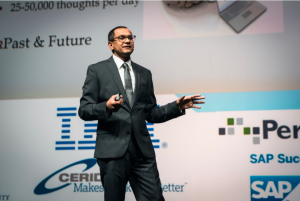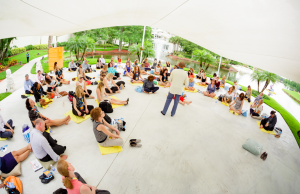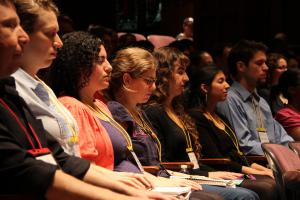Mindfulness Meditation Coming to the WorkHuman Conference with Mindful Leadership Expert, Pandit Dasa
Leading Mindfulness Expert, Pandit Dasa will speak on Mindful Leadership at the WorkHuman Conference, which will be attended by Michelle Obama.
This year's WorkHuman conference will be attended by former First Lady Michelle Obama and Julia Louis-Dreyfuss from hit television show "Seinfeld."”
NEW YORK, NY, USA, May 25, 2017 /EINPresswire.com/ -- Human resource professionals are turning towards Mindfulness practices such as being aware of thoughts and emotions and staying in the present moment. These mindful leadership practices are reducing employee stress and anxiety and improving productivity. At all three annual WorkHuman conferences, Pandit Dasa, Mindful Leadership Expert, has introduced and offered Mindfulness workshops to the many HR professionals that have attended. This year's WorkHuman conference will be attended by former First Lady Michelle Obama and Julia Louis-Dreyfuss from hit television show "Seinfeld."— Pandit Dasa
Mindfulness training helps us understand the mind. The mind works a lot like a smart device. If too many apps are open, it slows the device down and prevents it from functioning at its optimal capacity. Closing apps on a phone is pretty easy. With a few clicks and swipes, you’re ready to go. If that doesn’t do it, turning the device off and on again will speed things up. Just as we leave open a lot of apps on our phone, we leave a lot of apps open in our mind that end up distracting us and ultimately drain our mental focus and energy. Imagine never closing the apps on your phone for the entire time you own it. We do that with our mind. We leave apps open for years, decades and sometimes our entire lives. In order for us to be able to close our mental apps, we need to become aware of how our mind functions and then we’ll gradually begin to recognize which apps are running in the background. This is where Mindful Leadership Expert, Pandit Dasa, shows the value of mindfulness meditation. There’s no way to fully shut the mind off, but there is a way to focus the energy.
These “mental apps” are the positive and negative memories from our past. It’s the negative apps or memories that drain our energy. They pop up randomly without any effort on our part. It’s sort of like the annoying pop-up window that shows up when you enter a website. If only we could “x” out the negative memories as easily as we close a window on our browser. We don't voluntarily choose to relive difficult situations from the past, but they keep resurfacing and replaying themselves in our mind continuing to cause us stress and anxiety. Mindfulness meditation helps us press pause during negative recollections and allows us to move forward in a positive way.
Feeling that my mind was getting the best of me during a very challenging time in life, I decided to go on an inward journey in meditation.
How Does Mindfulness Benefits the Workplace?
According to the American Institute of stress, 46% of our stress comes from our workload and workplace stress is costing American businesses over $300 billion per year. Most people spend more than half of their waking time at work or doing work related things such as commuting. So it shouldn’t come as a surprise that half of our stress comes as a result of our work. There are many ways to deal with stress. Exercise, eating healthy, having positive relationships and the most recent development in terms of dealing with stress is the practice of mindfulness through mindfulness workshops and trainings. Up until recently, meditation and mindfulness were seen as purely spiritual practices engaged in for the purpose of enlightenment or nirvana. However, over the last few decades, research from institutions such as Harvard, MIT, University of Pennsylvania and the University of Wisconsin- Madison are showing that individuals who actively engage in meditation practices, are demonstrating lower levels of stress, anxiety and even depression.
The secular practice of mindfulness does not involve adopting specific faith or submitting to any diety or saint. The practices include certain breathing exercises to release bodily tension, focusing exercises to become aware of and strengthen the mind and visualization techniques to develop positive thinking habits. In general, the idea is to become aware of our thoughts and emotions and try to remain in the present moment. These practices are especially important if we are aspiring to become mindful leaders. We are all aware of how turbulent our mind and thoughts can be. Even while having a conversation with someone, we begin planning other things. While eating one meal, we start thinking about the next one. Just as certain apps cannot be deleted off of our smart device, the food app is one of those that we can’t delete and remains constantly open.
Because of the research, corporations, college campuses, the military, professional sports, high schools and medical institutions are implementing mindfulness meditation to help individuals cope with challenging and stressful situations and to empower people to remain calm and collected. The research is also showing that those who practice mindfulness demonstrate higher levels of emotional intelligence. This is tremendously beneficial when we are called to cooperate and work in harmony with others. It helps us understand other individuals’ perspectives and point of you and gives us the strength to put aside our ego for the greater good of the organization.
Pandit Dasa
Conscious Living, LLC
614-286-1080
email us here
Mindful Leadership and Mindfulness Workshops with Pandit Dasa



